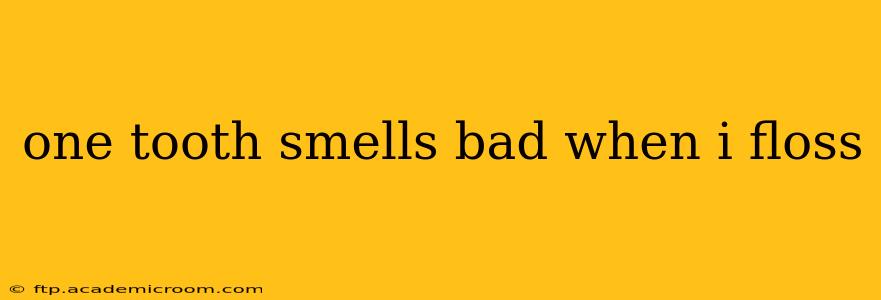Flossing is crucial for maintaining good oral hygiene, but discovering a persistent bad smell coming from just one tooth after flossing can be alarming. This isn't just about bad breath; it often signals an underlying dental problem requiring attention. Let's explore the potential causes and how to address this issue effectively.
Why Does One Tooth Smell Bad After Flossing?
The unpleasant odor emanating from a single tooth after flossing usually points to localized infection or decay. The act of flossing dislodges food particles and bacteria trapped between teeth and along the gumline, revealing the source of the smell. Here are some common culprits:
-
Gum Disease (Gingivitis or Periodontitis): Inflamed gums harbor bacteria, leading to a foul odor. If the inflammation is concentrated around one tooth, it may be the primary source of the smell. Advanced gum disease (periodontitis) can cause pockets to form, trapping even more bacteria.
-
Cavities (Dental Caries): Decayed tooth structure provides a perfect breeding ground for bacteria. The deeper the cavity, the more intense the smell can be. Flossing may dislodge decaying matter, releasing the odor.
-
Food Impaction: A piece of food lodged deep between teeth or under the gumline can decompose, creating a noticeable odor. While flossing usually removes most food particles, a stubborn piece might remain and fester.
-
Abscess: A tooth abscess is a severe infection at the root of the tooth. It's often accompanied by throbbing pain, swelling, and a very strong, unpleasant odor. This requires immediate professional dental care.
-
Broken Filling or Crown: A cracked or dislodged filling or crown can create a space where food and bacteria accumulate, resulting in an odor.
-
Dental Sensitivity: While not directly causing a smell, sensitive teeth may react negatively to flossing, potentially leading to inflammation and slight odor if bacteria are already present.
What to Do If One Tooth Smells Bad After Flossing?
Addressing the issue promptly is crucial to prevent the problem from worsening. Here's what you should do:
1. Thorough Cleaning:
- Floss Carefully: Ensure you're flossing correctly, reaching the entire gumline and between teeth. Use a gentle but thorough technique.
- Brush Thoroughly: Brush your teeth for at least two minutes, twice a day, using fluoride toothpaste. Pay extra attention to the affected tooth and surrounding area.
- Rinse with Mouthwash: Use an antimicrobial mouthwash to help kill bacteria and reduce odor.
2. Schedule a Dental Appointment:
If the bad smell persists despite diligent cleaning, a visit to the dentist is essential. They can diagnose the underlying cause and recommend appropriate treatment.
3. Professional Cleaning:
Your dentist will likely perform a professional cleaning to remove plaque and tartar buildup, which can contribute to bad breath.
4. Treatment Options:
Depending on the diagnosis, treatment might involve:
- Filling: For cavities.
- Root Canal: For severe infection or abscess.
- Extraction: In cases of extensive damage or infection.
- Gum Disease Treatment: Scaling and root planing to remove bacteria and infection from the gums.
Frequently Asked Questions
Can poor dental hygiene cause one tooth to smell worse than others?
Yes, absolutely. Bacteria thrive in areas with plaque and food buildup. If you don't floss or brush effectively, bacteria can accumulate around specific teeth, leading to localized infection and odor.
Does a bad-smelling tooth always mean a cavity?
No, a bad-smelling tooth isn't always indicative of a cavity, though it's a strong possibility. Gum disease, abscesses, and food impaction can also be contributing factors. A professional dental examination is crucial for accurate diagnosis.
What home remedies can help with a bad-smelling tooth?
While home remedies can temporarily mask bad breath, they won't address the underlying cause. Thorough brushing and flossing are the best home approaches. Using a mouthwash with antimicrobial properties can also provide temporary relief but it shouldn't replace professional dental care.
Is it normal for one tooth to feel sensitive after flossing?
Some sensitivity after flossing isn't unusual, particularly if you have gum recession or exposed tooth roots. However, persistent or severe sensitivity warrants a dental check-up.
Remember, addressing a bad-smelling tooth promptly is crucial for preventing further dental problems. Ignoring the issue can lead to more severe complications, so don't hesitate to seek professional dental care.
